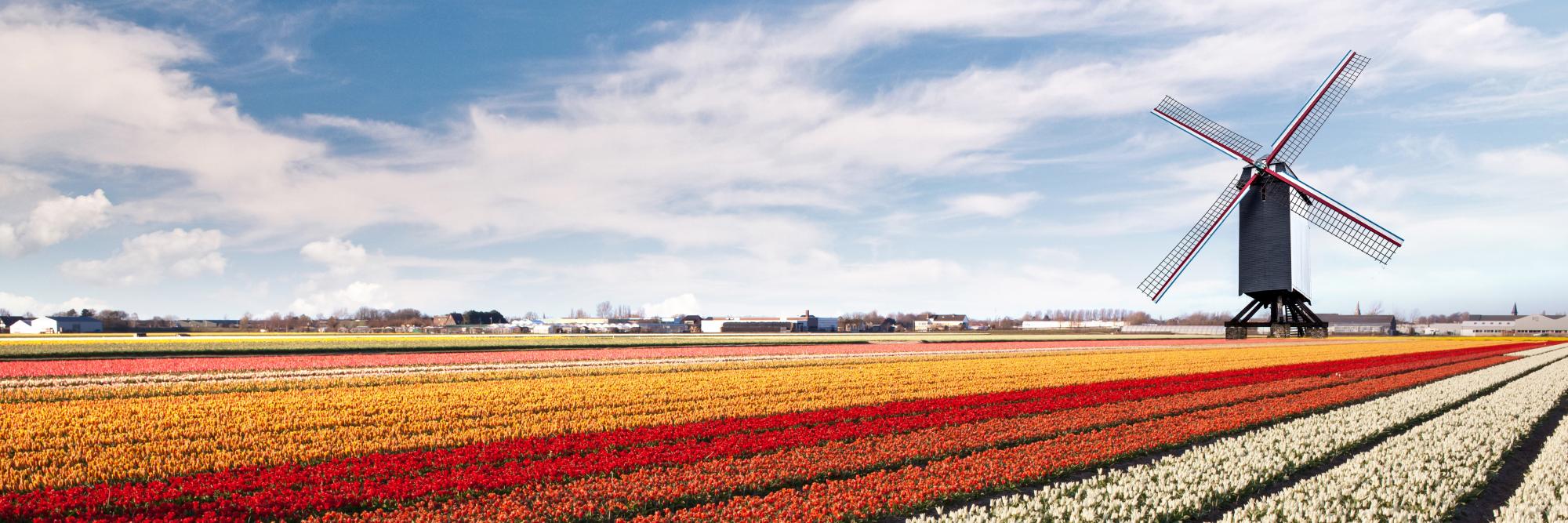Lisa is Chinese by race, born in Indonesia and raised in Singapore. In 2004, she moved to the Netherlands for love and now calls Haarlem home. She finds Haarlem to be full of energy and completely different to what she was accustomed to – weather included! She’s a stay-at-home mom and loves dragging her kids along to explore the country whenever she gets the chance. Keep up with her life in the Netherlands by reading her blog, or follow her adventures on Facebook.
Read more about expat life in the Netherlands in our Expat Arrivals country guide.
About Lisa
Q: Where are you originally from?
A: I am Chinese by race, but I was born in Medan, Indonesia.
Q: Where are you currently living?
A: Haarlem in the Netherlands.
Q: When did you move here?
A: January 2004
Q: Is this your first expat experience?
A: No, I have lived in Jakarta, Singapore (twice) and Australia before.
Q: Did you move here alone or with a spouse/family?
A: I moved on my own but had my boyfriend waiting for me here.
Q: Why did you move; what do you do?
A: I fell in love with a Dutchman. After more than a year of a long-distance relationship, being together in the same country was the next step. Since I was already an expat living in Singapore, I had no problem moving country again. Fast forward to today, we have two kids, and I am a housewife.
Living in Haarlem
Q: What do you enjoy most about Haarlem?
A: Haarlem is a beautiful historical city in the Netherlands. The city is filled with Dutch charms like windmills, cobblestone roads, draw bridges, gabled houses, hidden courtyards and striking architecture. It is ideally located just 15 minutes from Amsterdam by train and well-connected to the rest of the country. The beach, sea, dunes and national park are all just a bike ride away. Haarlem offers an excellent shopping experience and a diverse dining culture. It has a large international community, which makes it perfect for expats with children. Life is very good in Haarlem.
Q: Any negative experiences? What do you miss most about home?
A: Dutch people are not known for their culinary traditions. It is rather monotonous and bland, consisting of cold sandwiches for lunch and warm meals of meat, potatoes, and vegetables for dinner. I miss proper Asian food.
Q: What are the biggest adjustments you had to make when settling into expat life here?
A: I was so used to life in Singapore, dining out every night at cheap hawker centres and food courts. Dinner out in the Netherlands is expensive, so I have to cook. Apparently, I am not a good cook. I continue to struggle with this.
Q: Did you experience any particular elements of culture shock?
A: It was my very first Dutch social affair – my boyfriend’s birthday party. Guests arrived at the door with big smiles and started introducing themselves, which was then followed by three kisses on my cheek and wishing me “Congratulations!”. Huh?? The Asian culture of respecting personal space clearly was not applicable, and congratulating practically everybody in the room was apparently the norm. I have never been so confused in my life!
Q: What’s the cost of living compared to home?
A: Needless to say, almost everything in Indonesia is cheaper compared to the Netherlands.
Q: How would you rate the public transport in Haarlem? What is your most memorable experience of using the city’s transport system?
A: The transport system is very accessible. Buses and trains in Haarlem run frequently with routes to major neighbouring cities like Amsterdam. I used to travel with my little one in a stroller and my other kid holding the other hand with such ease on any public transportation. Visiting different cities was such a breeze. We have great memories, thanks to the fantastic transport system.
Q: How would you rate the healthcare in Haarlem? Have you had any particularly good/bad experiences with regard to doctors and hospitals?
A: Health insurance in the Netherlands is mandatory for everyone age 18 and above. This will cover at least the basic medical care, medicines and hospital stays. It is a blessing! You will need to register yourself with a General Practitioner (GP) in your local area. It is essential because it links you to other services such as hospitalisation, specialists, physiotherapy, etc. Without it, your access to medical care may be limited and costly.
With regard to my experience … Dutch GPs are notorious for advising you to go home, get some rest and take paracetamol. You may call back again the next week if you are not feeling any better.
Anyways, preventive care is rare here, especially for women’s health. Insurance will only pay for a pap test (procedure to test for cervical cancer) once every five years for women aged 30-60, and those over 50 years old get a mammogram (breast x-ray) every two years. When I turned 40, I asked my GP for a clinical breast exam. I was told it was completely unnecessary. I had to insist.
Q: What are the biggest safety issues facing expats living in Haarlem? Are there any areas expats should avoid?
A: Haarlem is a safe city, and crime rates are generally very low. Expats tend not to favour the Schalkwijk area, probably due to its diverse ethnic inhabitants and lack of housing choices amongst the flats for low-income families. I beg to differ. We managed to find a great newly built house in this part of Haarlem, near all facilities and amenities, including the convenience of public transportation and motorways.
Q: How do you rate the standard of housing in Haarlem? What different options are available for expats?
A: Property prices have soared in recent years, but there are plenty of affordable possibilities in Haarlem. Expats could consider neighbouring towns such as Overveen, Bloemendaal, Heemstede and Aerdenhout, too.
Q: Any areas or suburbs you’d recommend for expats to live in?
A: If you can afford it, try neighbourhoods such as Kleverpark, Leidesbuurt, Garenkokerskwartier, Bosch en Vaart, and Koninginnebuurt. These areas are very close to the old city centre.
Meeting people and making friends
Q: How tolerant are the locals of foreigners? Is there obvious discrimination against any particular group? Have you ever experienced discrimination in the Netherlands?
A: I have never experienced any discrimination in the Netherlands. Locals are generally quite friendly and eager to help me out in English. But some people quickly assumed I am from China since I am Chinese. Imagine their surprise when I told them I had never been to China.
Q: Was meeting people and making friends easy? How did you go about meeting new people?
A: I have friendly neighbours and two kids that go to a regular Dutch school. It was not difficult for me to make friends under these circumstances.
Q: Have you made friends with locals, or do you mix mainly with other expats? What advice would you give to new expats looking to make friends with the locals?
A: I do make friends with the locals, but hang out mostly with other expats. Probably because it is so much easier to express myself in English than in Dutch. My advice is to try to strike up a small conversation with the locals whenever you can. Don’t be afraid to speak English to them. However, do make an effort to learn Dutch along the way. Language is a barrier to local friendships.
Getting visas sorted
Q: Was getting a work permit or visa a relatively easy process? Did you tackle the visa process yourself, or did you enlist the services of an immigration consultant?
A: The visa process was not difficult, but it took nearly four months! I had to enlist a family member living in Jakarta to help kickstart the tedious procedure while I maintained my job in Singapore. Official documents had to be officially translated and then legalised. Naturally, it was expensive!
Family life in Haarlem
Q: What are your favourite family attractions and activities in Haarlem?
A: There are so many things to do in Haarlem. Some of our favourites include visiting Teylers Museum (the oldest museum in the Netherlands), exploring Kinderboederij de Houthoeve (largest petting zoo in Haarlem), shopping at Saturday market (for battered fried fish kibbling, stroopwafels or our favourite fruits), eating breakfast at La Place Dreefzicht, going for a nature walk at Haarlemmerhout (oldest public park in the Netherlands), biking to Zandvoort beach or to a lake called Het Wed in the National Park Zuid Kennemerland, checking out books at Bibliotheek national library, going for a movie at Pathé cinema and swimming at Boerhaavebad.
Final thoughts
Q:Is there any advice you would like to offer new expat arrivals to the Netherlands?
A: If possible, join local groups on Facebook. It is the easiest way to get information and ideas from fellow expats and parents. It’s one way to make fast friends in a new country.
► Interviewed October 2019



